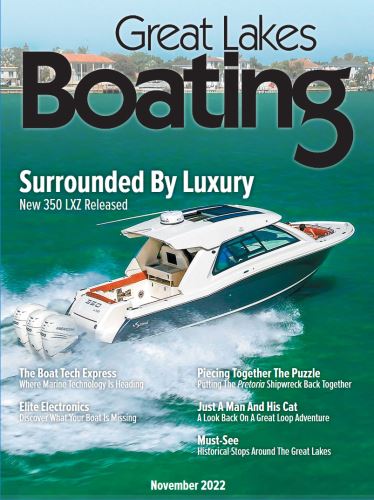Editorials March/April 2016
March 2016
Editorials
GLB Admin
Unite on Behalf of Boating and Fishing
Boating and fishing go hand-in-hand just like peanut butter and jelly. The problem is that we sometimes get so focused on either boating or fishing that we can’t see the importance of bringing them together. A recent example can help in this matter.
When the National Marine Manufacturers Association, with more than 1,400 members representing large and small boat builders, engine manufacturers, marine gear and equipment retailers, and other accessory suppliers, and the Marine Retailers Association of America, representing boat and engine dealerships, service centers, and other marine-related services, announced that they were joining their political action committees together to create one super PAC called BoatPAC, few recreational boaters or sportfishermen even noticed it. Unfortunately, the significance of this one simple action goes far beyond the two organizations. It’s a clear sign of a call for unity.
The merger of these two PACs is huge for the boating industry because it says, “Let’s not fight one another when we want the same goals. Let’s join forces and create a stronger, more united front to grow, develop and sustain boating.”
It’s hard for boaters to realize that their interests, i.e., clean waters, rivers, and streams, more fish, better infrastructures, and more economic growth and development, are the same ones no matter if they boat in Duluth, Minnesota, Sheboygan, Wisconsin, or are sportfishermen in Traverse City, Michigan, and Buffalo, New York. Heck, it’s hard for fishermen to agree that their goals are the same no matter if they are boating, sitting on a pier, or casting from the shoreline.
The Pew Research Center recently published an article on science and society, and we cite it because it highlighted a great divide between scientists and society on a variety of issues, including the safety of genetically modified fruit and vegetables, the perils of world population growth, and the use of animals in lab experiments.
While science and society may differ on certain issues, there are certain ones that all can agree on and support. The vast majority of both sides agree that our STEM (science, technology, engineering, and math) education in K-12 is lacking and must be improved. How this is done is an area of disagreement and controversy.
The same thing holds true for boaters and sportfishermen. The two sides may not agree on how much money should be allocated to fisheries as opposed to marina infrastructure. They may argue that fishing is more important than waterskiing, kayaking, or cruising. But they can all agree on the need for clean waters, protecting those waters from aquatic invasive species, and guaranteeing everyone free public access to our lakes, rivers, and streams.
The Great Lakes won’t remain great unless we all get behind the efforts to keep them clean and pristine. Now is the time to emphasize the things we all believe in and hold dear about boating and fishing, and minimize our differences. Now is time for everyone to get behind and present a united front on behalf of recreational boating and sportfishing.
Digital Is Here, But Print Isn't Dead
A recent article from the Pew Research Center stated that Millennials have less trust in the future of the country than their parents and grandparents. The article went on to say that while this may appear to be startling news, it really isn’t. Baby boomers, Gen X, Y, and Z all had the same views of their futures when they were in their 20s.
What is new, though, is the way(s) in which Millennials get news and information. Most Millennials turn to Facebook as their primary news source. In fact, Facebook now rivals traditional news organizations as the major source for news among all web users. Everyone seems to be proclaiming that print is dying, and digital communications is the wave of the future.
While this change in the way people gather information is noteworthy, it is important to remember that the major news was as unsettling 50 years ago as it is today.
The 1960s was a decade of tumultuous change marked by angry protests against the Vietnam War, riots in cities brought on by racial injustices, and defiance of authority figures found in family structures, politicians, and colleges and universities. The mantra of the 1960s was embodied in Bob Dylan’s song “The Times They Are A Changin.” That same mantra can be applied to the change from print to digital communications.
For everyone, the world is a 24 hours a day, 365 days a year marketplace of information. The difficulty is that in the race to be first to report a crime, leak a scandal, and criticize our politicians, the most accurate, most truthful stories, are not always put forth. The idea that what one sees on the Internet is true is far from the truth. What’s more staggering is the number of people, mainly Millennials, who believe this fiction.
The Digital Age may be upon us, but there’s nothing wrong with print media. Newspapers and magazines may be declining due to a more than 60 percent drop in ad revenue between 2003 and 2014, but their influence may be greater. Unlike their digital brethren, newspapers and magazines labor hard to print the truth and tell not just that things happened, but why they occurred.
Today, news organizations are adapting to the digital age, and so are we as a magazine. Instead of asking you to choose one or the other option, we are offering both forms of communication because we believe that print and digital communications compliment one another.
You are reading this magazine, so we know that you like print media. For those who don’t want or have the time to read the print issue, they can find everything in the magazine and much more by visiting our website: www.greatlakesboating.com.

